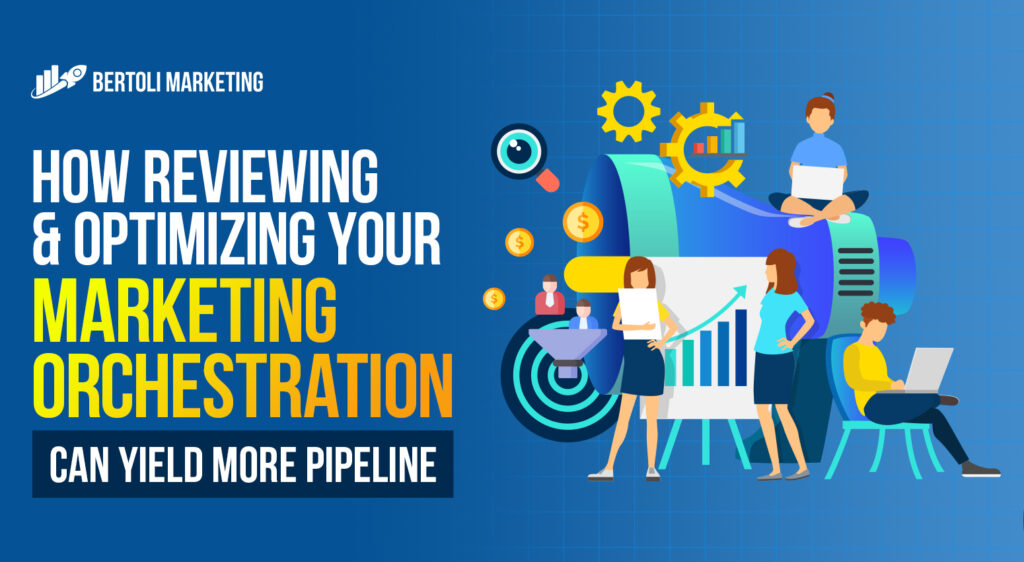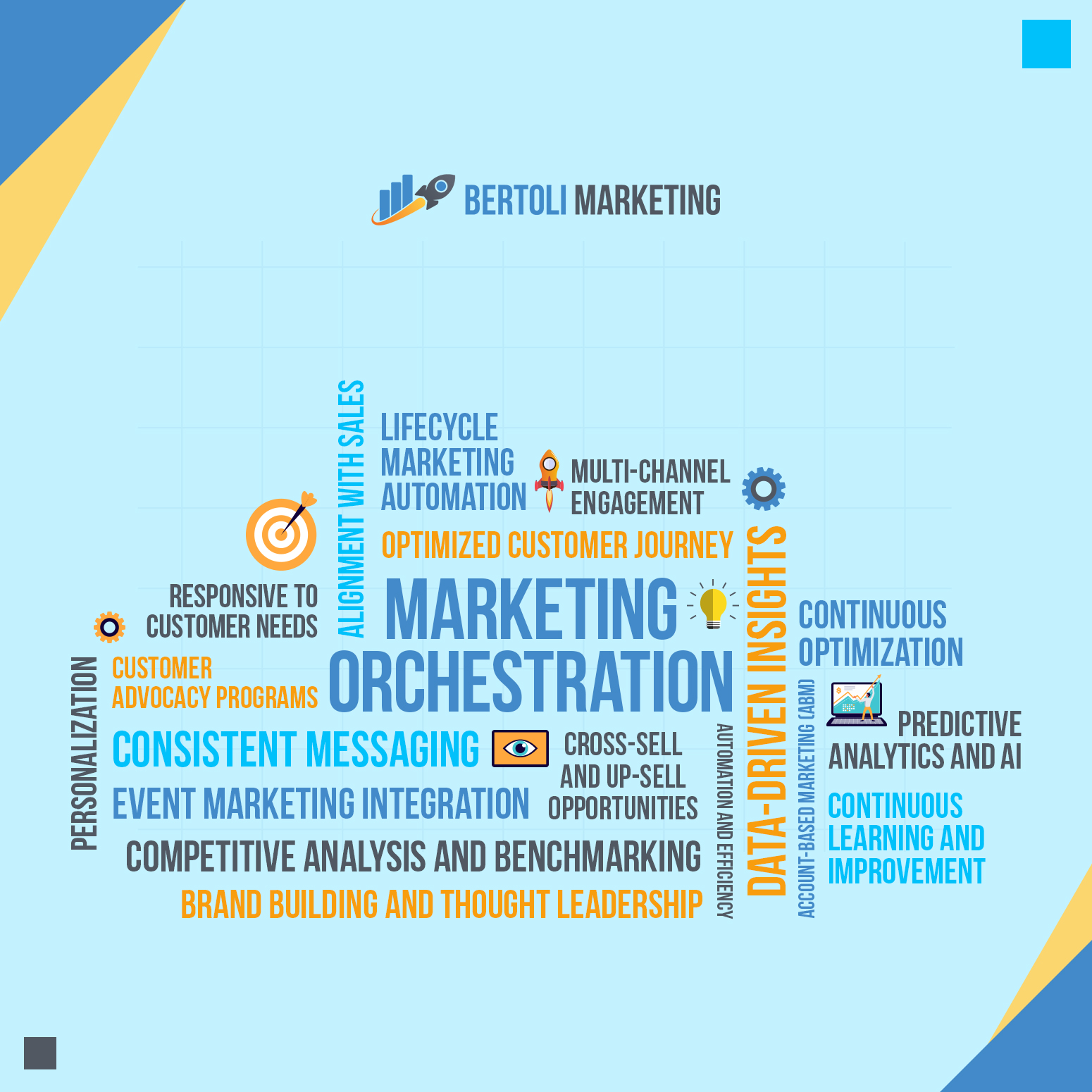
Marketing orchestration is the strategic coordination of various marketing channels, tactics, and messages to deliver a unified and seamless experience to potential customers throughout their buying journey. It involves synchronizing efforts across different platforms such as email, social media, content marketing, advertising, events, and more, to ensure that each touchpoint contributes to the overall marketing goals. It’s crucial to understand how your marketing orchestration can help you generate more pipeline:

In conclusion, marketing orchestration is a holistic approach that encompasses a wide range of strategies, tactics, and technologies to generate more pipeline. By integrating and coordinating marketing efforts across channels, leveraging data and automation, and focusing on customer-centric strategies, businesses can drive meaningful results and achieve their pipeline goals.
Tech Company Case Study:
Background: A SaaS company specializing in project management software wants to increase its pipeline by targeting mid-sized businesses in the technology sector.
Strategy: The company implements marketing orchestration by integrating its CRM system with marketing automation tools. They develop a multi-channel strategy including content marketing, email campaigns, social media advertising, and webinars targeting their ideal customer profile.
Results: By orchestrating their marketing efforts, the company achieves a 30% increase in leads generated within six months. They attribute this success to personalized content, targeted messaging, and efficient lead nurturing workflows.
Retail Brand Case Study:
Background: A fashion retailer aims to boost online sales and attract new customers to its e-commerce platform.
Strategy: The retailer employs marketing orchestration by combining email marketing, social media promotions, influencer partnerships, and personalized recommendations based on customer behavior and preferences.
Results: Through marketing orchestration, the retailer experiences a 25% increase in website traffic and a 15% rise in online sales within three months. The coordinated approach across channels helps drive customer engagement and conversion.
Financial Services Case Study:
Background: A financial advisory firm seeks to expand its client base and increase assets under management (AUM) by targeting high-net-worth individuals.
Strategy: The firm adopts marketing orchestration by implementing account-based marketing (ABM) tactics, including personalized direct mail campaigns, targeted LinkedIn advertising, and exclusive networking events for prospective clients.
Results: Through marketing orchestration, the firm sees a 40% increase in qualified leads and a 20% growth in AUM over the course of a year. The tailored approach to ABM enhances brand visibility and credibility among their target audience.
Hospitality and Tourism Case Study:
Background: A luxury resort aims to increase bookings and revenue during the off-peak season.
Strategy: The resort implements marketing orchestration by leveraging a combination of tactics such as email marketing, social media advertising, influencer partnerships, and targeted promotions on travel booking platforms. They also create personalized vacation packages based on customer preferences and past booking history.
Results: Through marketing orchestration, the resort experiences a 35% increase in bookings and a 25% rise in revenue during the off-peak season. The coordinated marketing efforts across channels attract both new guests and repeat visitors, driving occupancy rates and boosting profitability.
Healthcare Services Case Study:
Background: A medical clinic specializing in holistic wellness services wants to attract new patients and increase appointment bookings.
Strategy: The clinic employs marketing orchestration by implementing a comprehensive digital marketing strategy encompassing content marketing, email newsletters, social media engagement, and targeted Google Ads campaigns. They also offer educational webinars and workshops to showcase their expertise and attract potential patients.
Results: Through marketing orchestration, the clinic achieves a 40% increase in new patient registrations and a 30% growth in appointment bookings within six months. The integrated approach to marketing helps build brand awareness, establish trust with the community, and drive patient engagement.
Education and Training Case Study:
Background: A professional training institute seeks to enroll more students in its certification programs.
Strategy: The institute adopts marketing orchestration by developing a multi-channel marketing strategy that includes content marketing, email campaigns, social media advertising, and partnerships with industry associations. They also offer free webinars and workshops to showcase the value of their programs.
Results: Through marketing orchestration, the institute experiences a 50% increase in course enrollments and a 20% rise in revenue within a year. The coordinated marketing efforts help position the institute as a trusted provider of professional training and attract students seeking to advance their careers.
Automotive Industry Case Study:
Background: A car manufacturer launches a new electric vehicle model and aims to generate buzz, increase test drives, and boost pre-orders.
Strategy: The manufacturer employs marketing orchestration by implementing a comprehensive launch campaign. They utilize a mix of traditional and digital channels, including TV commercials, social media ads, influencer partnerships, and email newsletters. Additionally, they organize test drive events at dealerships nationwide and offer special incentives for pre-orders.
Results: Through marketing orchestration, the car manufacturer achieves significant success, with a 50% increase in test drive requests and a 30% rise in pre-orders within the first month of the launch campaign. The coordinated efforts across multiple channels help create excitement, drive customer engagement, and generate substantial interest in the new electric vehicle.
Real Estate Development Case Study:
Background: A real estate development company plans to promote a new residential project and attract potential buyers.
Strategy: The company implements marketing orchestration by developing a targeted marketing campaign tailored to potential homebuyers. They utilize a mix of digital marketing tactics such as social media advertising, email marketing, and search engine optimization (SEO). They also collaborate with local real estate agents and host open house events to showcase the property and engage with prospective buyers.
Results: Through marketing orchestration, the real estate development company achieves impressive results, including a 40% increase in website traffic, a 25% rise in inquiries from interested buyers, and a 20% increase in property sales within the first few months of the campaign. The coordinated approach helps raise awareness, generate leads, and drive sales for the residential project.
Food and Beverage Industry Case Study:
Background: A specialty food company launches a new line of organic snacks and aims to increase brand awareness and drive product sales.
Strategy: The company employs marketing orchestration by implementing a multi-channel marketing campaign targeting health-conscious consumers. They leverage social media platforms such as Instagram and Facebook to showcase the product’s features and benefits. They also partner with health and wellness influencers to promote the snacks to their followers. Additionally, they distribute samples at local grocery stores and health food stores to encourage trial and purchase.
Results: Through marketing orchestration, the specialty food company achieves notable success, with a 50% increase in social media engagement, a 30% rise in website traffic, and a 25% increase in product sales within the first quarter of the campaign. The coordinated efforts across various channels help raise awareness, generate interest, and drive sales for the new organic snack line.
These case studies illustrate how marketing orchestration can deliver significant results for businesses across diverse industries by coordinating marketing efforts across multiple channels, leveraging targeted messaging and personalized experiences, and driving customer engagement and sales.

Our mission is to help battery and energy industry companies quickly and effectively reach their revenue goals.
We’ll provide you with a complimentary digital marketing audit so that you can quickly learn how to optimize your digital presence. Just fill out the form below: